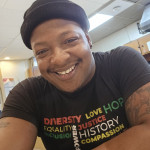In 1998, Shirley Selvage was not in a good place. She tested HIV positive that year, having contracted the virus from a male partner who later died. She told almost nobody but her family, who didn’t want to talk about it. Aiming to numb her pain, she turned to drugs and became addicted. And in those very early days of effective HIV treatment, she was taking a whopping 24 pills a day.
“It was dark.” That’s how Selvage recalls that era. But her “safe haven,” as she calls it, was Birmingham’s acclaimed 1917 Clinic, an HIV specialty shop within the University of Alabama (UAB). “I’d get a hug there and be treated like a human being,” she says. Her provider there was the pioneering HIV researcher Michael Saag, MD. “I was deep in my addiction and very angry and defensive, but every time I came in, he’d encourage me and say, ‘You look good.’”
That was the start of a change. In the following years, in a remarkable trajectory, Selvage, now 53, went to rehab, started volunteering at 1917, attended UAB and earned her bachelor’s degree, landed an internship and then a job at 1917, earned her master’s degree in community health at UAB and then got an additional job teaching first aid to UAB undergrads.
“I was a statistic, but my life turned around,” she says. Eventually, she started speaking publicly, telling her story and encouraging others to get tested or, if diagnosed positive, treated for HIV. In 2016, she was named to the annual POZ 100 list for her extraordinary service to the HIV community.
“I only hate that I lived my life in isolation all those years,” she says. Her wake-up call came when she told an entire room of her undergrad classmates about her HIV status—and nobody flinched. “They accepted me. That was the day I found my voice.”
In her current job as a health education coordinator at 1917, Selvage leads support groups for newly diagnosed folks, coordinates volunteers and students who shadow the providers and goes out into the community to help with HIV rapid testing and to teach sexual health. “I enjoy giving others hope and encouragement,” she says. “Yesterday, I was speaking to a newly diagnosed young man and said to him, ‘Hey, you can come here and talk to people.’”
Of course, one of the topics she discusses with her clients is how to advocate for themselves when communicating with their HIV providers and care team. Remarkably, Saag is still her provider after 22 years. He wrote her a glowing recommendation for grad school. Together, they’ve navigated Selvage’s treatment journey: from those early 24 pills a day, to a one-pill-daily regimen she was on from about 2006 until 2011, to a two-pill-daily regimen she’s been on ever since, which she finds a cinch—no side effects. “I just take it with my blood pressure medication every morning and don’t really notice it,” she says. Other newer options, such as long-acting injectables, if appropriate for her, could be on the table.
It’s all about honest and direct communication, she says, with your HIV provider and/or care team, which at 1917 includes a doctor, nurse practitioner, nurse, social worker, linkage-to-care coordinator, dietitian and, if needed, a counselor or psychiatrist. “To folks who’ve just tested positive who I counsel, I say, ‘There’s only two things you have to do—come to your appointments and take your meds. And if you don’t like your meds for whatever reason, you have to let us know so we can work out a solution together.’”
Selvage knows this firsthand. At one point, she told Saag she wanted to go off her HIV meds in favor of natural herbs. He let her but urged her to tell him the minute she felt ill. “I started getting feverish and sick after a month,” she says, “and realized that my HIV meds had actually been working.” Back on them she went.
Other good advice? “Make a list of everything you want to talk to your provider about before you come, so you won’t forget,” she says. “We actually have volunteers in our waiting room to help patients with this.” What if you don’t like your provider? “It’s important to be honest about it,” she says. Health centers or HIV agencies can often help you find an alternative. And if you’re experiencing challenges, like depression, addiction, housing instability, economic stress or domestic violence or harassment, don’t be ashamed to speak up, says Selvage.
“It’s so important to be honest with your care team,” she says, “because they very likely have resources that can help you.” She says, she and her team at 1917 recently helped a patient get away from her abusive male partner and to a safe women’s residence.
When Selvage isn’t working, she loves to visit Gulf Coast beaches with her nephews, nieces and grandkids, hang out with coworkers, eat salmon with lemon pepper or simply walk her little Yorkie mix Sasha. But she really loves telling her story—especially if it helps someone transition from the fear and silence she once knew to a place of confidence and empowerment.
“I just want other people to hear that message of hope,” she says. “Because for many years, I didn’t have it myself.”







Comments
Comments